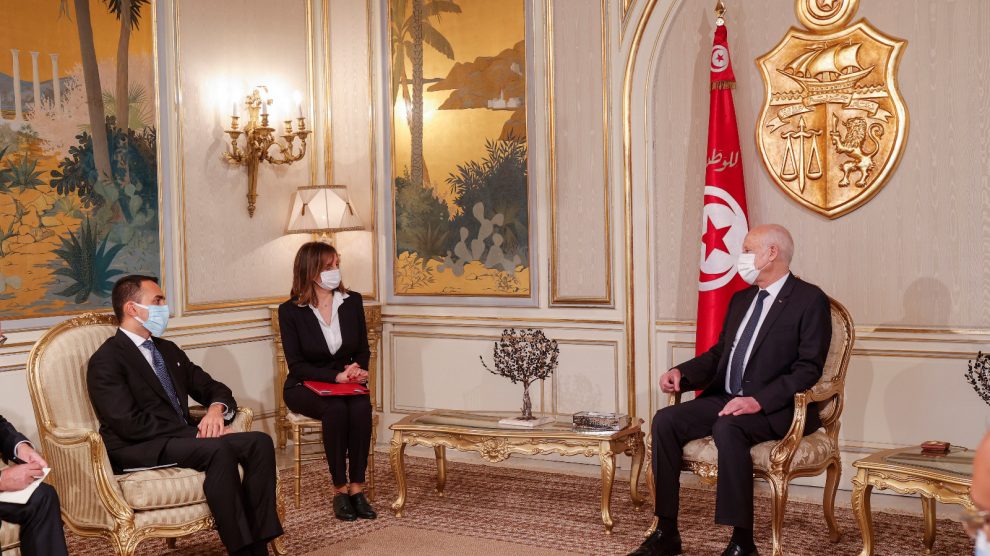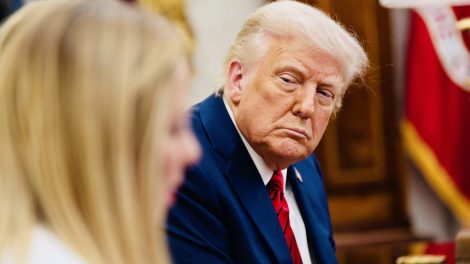Italian Foreign Minister Luigi Di Maio’s visit to Tunis on Tuesday touched on a plethora of sensitive issues, ranging from energy to waste (a year ago, 212 containers of Italian waste were brought to the country) and migration, as over 15,600 Tunisians headed for Italy in 2021.
Italy acts as an interlocutor for Tunis, where the institutional crisis seems to have found a delicate balance with the roadmap announced by the presidency. Rome’s goal is to seek additional forms of stability in the Mediterranean.
Mr Di Maio met Foreign Minister Othman Jerandi, the interim Prime Minister Najla Bouden Romdhane and President Saied. “[Our] dialogue with Tunisia has never been interrupted. It is a friendly country,” said the Italian head of diplomacy.
MP Majdi Karbai speaking
“We hope that during the Italian minister’s visit to Tunisia […] the delicate issue of migrants was addressed by talking about safe and legal channels of access to Europe,” said Majdi Karbai, a 37-year-old Tunisian MP elected at the last political elections in 2019 with the Democratic Current (Attayar).
The MP also expressed his hope that talks included the matter “of Italian waste illegally exported to Tunisia” and “the issue of rights in Tunisia, which are in danger following the ban on demonstrations and the trials of civilians before a court-martial. And freedom of the press, which has been lacking along with everything else since 25 July, when the president violated the constitution and seized all power.”
Matteo Colombo’s take
From the perspective of political science studies, Tunisia is a case of transition from a democratic system to competitive authoritarianism, noted Matteo Colombo, an expert on the MENA area at the Dutch think tank Clingendael Institute. There’s a ruling president and it’s difficult for opposition forces to have a say, what with a referendum set for the new year that edges towards stronger presidentialism.
“Notwithstanding the fact that Tunisia’s destiny is in the hands of Tunisians, Europe and Italy have wiggle room to help Tunis. The country’s economic development is the central matter and it’s in the interests of Rome and Brussels, where the vast majority of the Tunisian market flows. Then, of course, there is the issue of irregular immigration and the political support that must be granted in order to maintain the good things that have been done in recent years.”
These three elements fall within the interests of the EU, where a lot goes into the last point: Italy and the bloc intend to support democratic, free and open countries. So, how should they go about Tunisia? “It’s a small country, which basically does not need huge funds, and macro-economic projects could easily be financed by the EU,” argued Ms Colombo.
“We have seen in Libya how setting timeframes is not the best thing,” he continued, referring to the election deadline the UN had set for December 24, which was then postponed to an undefined date. “How to go about the transitions is more important. The EU must facilitate dialogue and the widest possible participation.”
Aid, conditions and the Italian role
Aid must entail conditionalities. Europe and Italy can ask for reforms and guarantees on the electoral path designed by President Saied, who has planned new elections for next year. There are ways to link the funds to reforms (the International Monetary Fund operates similarly). And within this framework, Italy – which has a domestic policy interest in Tunisia – is a leading country within the assistance mechanism.
“Minister Di Maio’s visit testifies to Italy’s closeness to Tunisia and its concrete commitment […] to promote peace, stability and security in the Mediterranean,” said the President of the Italian Chamber of Deputies’ Foreign Affairs Committee, Piero Fassino. “Tunisia is also a strategic partner of Italy in the common effort to promote and support the stabilisation of Libya.” A commitment that his committee “actively supports,” he added.
Image: the Italian Ministry of Foreign Affairs’ Twitter profile




